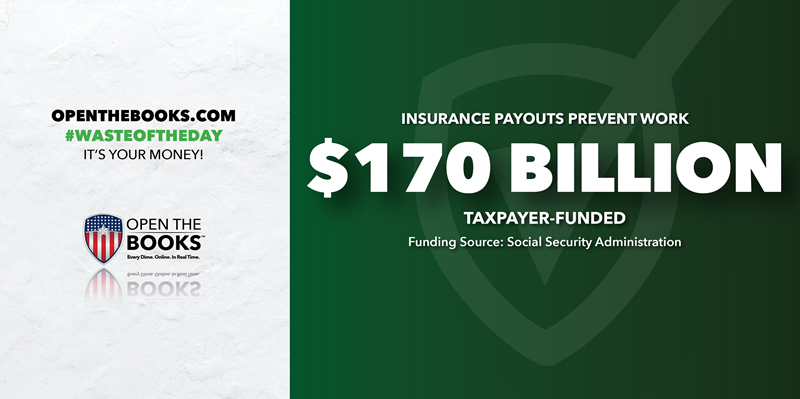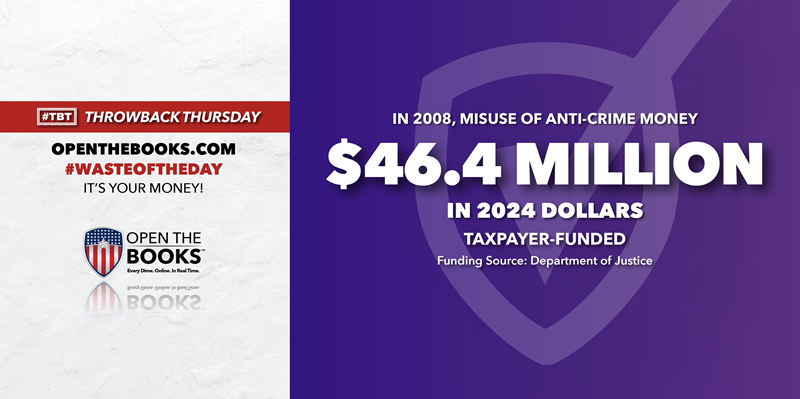
Shenanigans Net Texas City Manager $1.2 Million Exit
July 22, 2024

Topline: The official story is that T.C. Broadnax willingly left his job as city manager of Dallas and later accepted the same position with the city of Austin.
And yet he still collected a $423,246 severance payment from Dallas on his way out - which he was only supposed to receive if he was forced out - according to payroll records obtained by OpenTheBooks through an open records request.
Combined with his new contract in Austin, OpenTheBooks’ auditors estimate that Broadnax will earn $1.2 million from taxpayers over just 18 months.
Key facts: Rumors had circulated since June 2022 of Broadnax potentially resigning as Dallas city manager because of disagreements with the city’s mayor and council members.
This February, Broadnax finally decided to leave. There was just one problem: his contract said he would only be paid severance if he was fired or city council pressured him to resign.
Broadnax reportedly held “secret” conversations with eight Dallas city council members and asked them to demand his resignation, according to anonymous sources interviewed by WFAA. That triggered his severance clause, worth one year of salary. Broadnax and his colleagues have not refuted the report.
For months, city officials refused to tell reporters whether Broadnax would collect his severance, even after Mayor Eric Johnson publicly said the payment should be nullified.
Records obtained by OpenTheBooks confirmed that Broadnax received his payout on June 3, a month after he’d already started work as Austin’s city manager.
Dallas also paid Broadnax $43,789 for unused vacation time, $3,225 for a “vaccine incentive” and more.
He’s earned $611,000 from Dallas since Jan. 1, making him the highest-paid Dallas employee in OpenTheBooks’ records dating back to 2017.
Search all federal, state and local government salaries and vendor spending with the AI search bot, Benjamin, at OpenTheBooks.com.
Background: Broadnax’s new contract with Austin is one of the most generous deals for a local administrator in all of America.
His base salary is $470,000, higher than any other Texas city manager based on 2023 data. It’s also higher than the salary in Phoenix, Arizona, the most populous area with a city manager.
He’ll also get a housing allowance, cell phone allowance, vacation time and more.
The contract is worth at least $607,000 this year. That’s likely an underestimate; it doesn’t include his potential “house hunting expenses” and the extra money Austin will pay Broadnax on his allowances to offset federal income tax.
Critical quote: “The Texas Legislature ought to take the step to protect taxpayers by forbidding these golden parachutes for city employees in any locality in the state,” Dallas Mayor Johnson said in his weekly newsletter. “It's time for the Dallas City Council to take a stand by definitively stating that there won’t be a golden parachute clause in the next city manager’s contract.”
Summary: Public servants should spend their working hours helping their constituents, not devising schemes to take even more taxpayer money.
Bigtime Disability Payouts May Stop People from Working, Report Finds
July 23, 2024

Topline: Some disabled Americans on Social Security aren’t out of work solely because of their medical condition. Social Security payments themselves may “also contribute to disability beneficiaries’ reluctance to work,” according to a new report from the Government Accountability Office.
Key facts: Social Security paid $170 billion in disability benefits to 11 million people last year.
The GAO identified three issues with those payments that they say “disincentivize” beneficiaries from finding jobs.
The first reason is perhaps the most obvious: by returning to work, disability beneficiaries can lose some or all of their Social Security benefits and may end up with less income than if they were unemployed. They could also lose their Medicare or Medicaid coverage.
Social Security pays only for total disability — there are no benefits for partial disability or short-term disability.
If a person claims to be disabled and is working and earning more than $1,550 per month, they are not eligible for disability insurance payments. The Social Security Advisory Board has called this a “tax on work” that discourages employment.
Disabled Americans may also be hesitant to find work because potential benefit overpayments can leave them in debt, according to the GAO.
Between 70 and 80 percent of disabled individuals who return to work end up receiving too much money from Social Security because administrators often take too long to adjust benefit amounts.
Social Security then demands repayment once the mistakes are found, but sometimes the money has already been spent and the beneficiary struggles to refund it.
The rules for returning to work are also so complicated that some Americans don’t understand them and never bother looking for a job.
One disability advocate cited in the GAO report said the laws in the 60-page rulebook are “so numerous and complex” that even most Social Security employees can’t grasp them.
Search all federal, state and local government salaries and vendor spending with the AI search bot, Benjamin, at OpenTheBooks.com.
Background: Disabled Americans can be eligible for both Disability Insurance and Supplemental Security Income.
OpenTheBooks found that from 2021 to 2022, the Supplemental Security Income fund mistakenly sent out $10.6 billion in “improper payments” to the wrong person or for the wrong amount.
Disability Insurance, together with Survivors and Old-Age Insurance, lost $5 billion to improper payments.
Only about 20% of improper Social Security payments were recaptured.
Summary: Congress has previously acknowledged the dangers of the so-called “benefits cliff” in Social Security. Changes are needed to encourage recipients to find work without penalizing them for doing so.
Louisville Taxpayers Pay Nearly $600,000 For Empty Building’s Maintenance, Security
July 24, 2024

Topline: The city of Louisville, Kentucky closed its Urban Government Center building in 2016 with plans to sell the property to a housing developer. The space would be renovated entirely with private funding.
That agreement fell through. So did the next one. The current plan still has not been finalized. Meanwhile, the 10-acre property is collecting dust, and taxpayers have been forced to spend at least $588,000 since 2017 for maintenance and security at the vacant building.
Key facts: Records obtained by WDRB News show that taxpayers have been billed for lawn mowing, fence repair and more at the empty building. In the last two years, 86% of the costs have been for security services.
Trained guards at an unused building might seem frivolous, but they’re needed because looters sneak into the building to steal and sell scrap metal. Thirteen arrests have been made at the site since 2022.
Cliff Hayden, who manages a hotel next door, told WDRB News that thieves have even entered his establishment to steal air conditioners. Another local resident said she watched a man trespass on the property with five pizzas and a bottle of soda in his hands.
Services at the building have likely cost even more than $588,000. WDRB News says the dollar figure doesn’t include spending after this January or any federal funds that may have been spent by the Louisville Metro Housing Authority.
Search all federal, state and local government salaries and vendor spending with the AI search bot, Benjamin, at OpenTheBooks.com.
Background: The city purchased the Urban Government Center for $1.2 million in 1992 and plan to sell to a private real estate company for $1.7 million. Adjusted for inflation, that’s a $1 million loss.
But the sale is delayed because the buyers, Paristown Preservation Trust, want the city to approve a $20 million public subsidy to help fund the $249 million the Trust will spend to build houses in the area.
Paristown Preservation Trust is the third company to try and buy the property. Marian Group backed out in 2019 because it said the city was taking too long to get required land-use approvals. Underhill Associates’ deal was canceled in 2021 because the city thought Underhill’s private funding plan was shaky.
Supporting quote: Some Louisville residents support public subsidies for construction at the vacant building if it will finally speed up the process.
One neighbor told WLKY News, "I have not always been so lenient on this project … But at this point, this has taken so long, people think we live in a slum."
Summary: Louisville’s empty Urban Government Center is a perfect example of bureaucratic waste. While officials take years to act on a plan, taxpayers are footing the bill.
Throwback Thursday: Cities Used Crime Prevention Funds on Soccer Games, Paper Shredding
July 25, 2024

Throwback Thursday!
Topline: The Department of Justice’s “Weed & Seed” program had a noble goal of “weeding” out criminals and “seeding” crime prevention initiatives. But in 2008, the program used some of its $32 million Congressional appropriation not on police patrols and community safety groups, but to fund soccer games, hip-hop classes and more.
That’s according to the “Wastebook” reporting published by the late U.S. Senator Dr. Tom Coburn. For years, these reports shined a white-hot spotlight on federal frauds and taxpayer abuses.
Coburn, the legendary U.S. Senator from Oklahoma, earned the nickname "Dr. No" by stopping thousands of pork-barrel projects using the Senate rules. Projects that he couldn't stop, Coburn included in his oversight reports.
Coburn's Wastebook 2008 included 65 examples of outrageous spending worth more than $1.3 billion, including the money spent on “Weed & Seed” — which would be worth $46.4 million today.
Search all federal, state and local government salaries and vendor spending with the AI search bot, Benjamin, at OpenTheBooks.com.
Key facts: In both 1999 and 2004, the Government Accountability Office published reports warning officials that the Weed & Seed program had the potential to waste taxpayer money because it did not have “sound management practices.”
That was borne out in 2008. One police department in West Ashville, North Carolina used its Weed & Seed grant to host a “Shred-a-thon” where locals shredded cardboard boxes into mulch for a “Community Peace Garden.”
Youngstown, Ohio grant recipients provided lawnmower maintenance classes to local children. Allentown, Pennsylvania and Modesto, California both offered hip-hop and jazz dance classes.
One hundred sixth-graders in a Philadelphia school used grant funds to go on a camping trip. The spending was apparently justified because, as the school’s assistant principal lamented, “a great deal of time is focused on academics and little time is available for this type of experience.”
Indianapolis, Indiana spent part of its $1 million grant on an indoor soccer league and on buying paper traffic tickets.
The tickets, though, were not used for actual legal infractions. Police officers used them to notify locals who had left valuables inside their cars — just as a friendly reminder.
Perhaps drivers should have instead been warned about how much of their money was being spent on this so-called “crime prevention” measure.
Summary: The Weed & Seed program awarded grants to 300 cities over 19 years before it ended in 2010. How much money actually went toward fighting crime?
Biden’s ObamaCare Expansions Could Cost Another $383 Billion
July 26, 2024

Topline: President Joseph Biden’s recent decision to offer ObamaCare to some “Dreamers” will increase the federal deficit by an estimated $7 billion in the next 10 years, according to new analysis from the Congressional Budget Office.
Other proposed changes to ObamaCare could cost the federal government another $383 billion over 10 years, if enacted.
Key facts: Biden announced in May that Deferred Action for Childhood Arrivals (DACA) recipients — people who immigrated to the U.S. illegally as minors before June 2007 — can now get benefits from the Affordable Care Act, changing the Obama administration’s policy. The White House says this will help 100,000 people get health insurance.
That’s just a small part of the changes to the Affordable Care Act in the last few years.
In 2021, Biden’s pandemic stimulus package offered ObamaCare to more people than ever and gave existing consumers extra financial assistance.
The increased spending was supposed to end in one year, but Biden extended it to 2025. The president’s latest budget request to Congress calls for the expansion to be made permanent.
That would give ObamaCare to 6.9 million new people at a cost of $383 billion between 2025 and 2034, the CBO estimates. Half of those people would not have insurance otherwise, but the other half would enroll in ObamaCare when they could have used insurance offered by their employer, the CBO predicts.
Search all federal, state and local government salaries and vendor spending with the AI search bot, Benjamin, at OpenTheBooks.com.
Supporting quote: Voter advocate Antonio Arrellano told The Texas Standard that health insurance for Dreamers “is a significant step towards dismantling the barriers that have historically prevented marginalized communities from accessing essential services. With this rule change, over 100,000 young people will gain access to vital health care services, providing overall well-being and economic security that they so desperately yearn for.”
To be clear, DACA recipients were people brought to the U.S. before turning age 16and before June 15, 2007; they had to be under the age of 31 as of June 15, 2012, meaning they could be as old as 42 this year.
Critical quote: “The ACA premium tax credit expansion needlessly spent well over $100 billion of tax dollars for a minimal reduction in the number of uninsured,” Reps. Jodey Arrington (R-TX) and Jason Smith (R-MO) wrote in a letter to the CBO. “It is particularly concerning that … some of our nation’s highest earners are now eligible for government assistance. In certain areas of the country, a family making as much as $599,000 in 2023 could qualify for taxpayer-funded subsidies.”
Summary: Affordable healthcare is one of the most important issues facing the U.S., but we need solutions that don’t increase our already-insurmountable debt.
The #WasteOfTheDay is presented by the forensic auditors at OpenTheBooks.com.